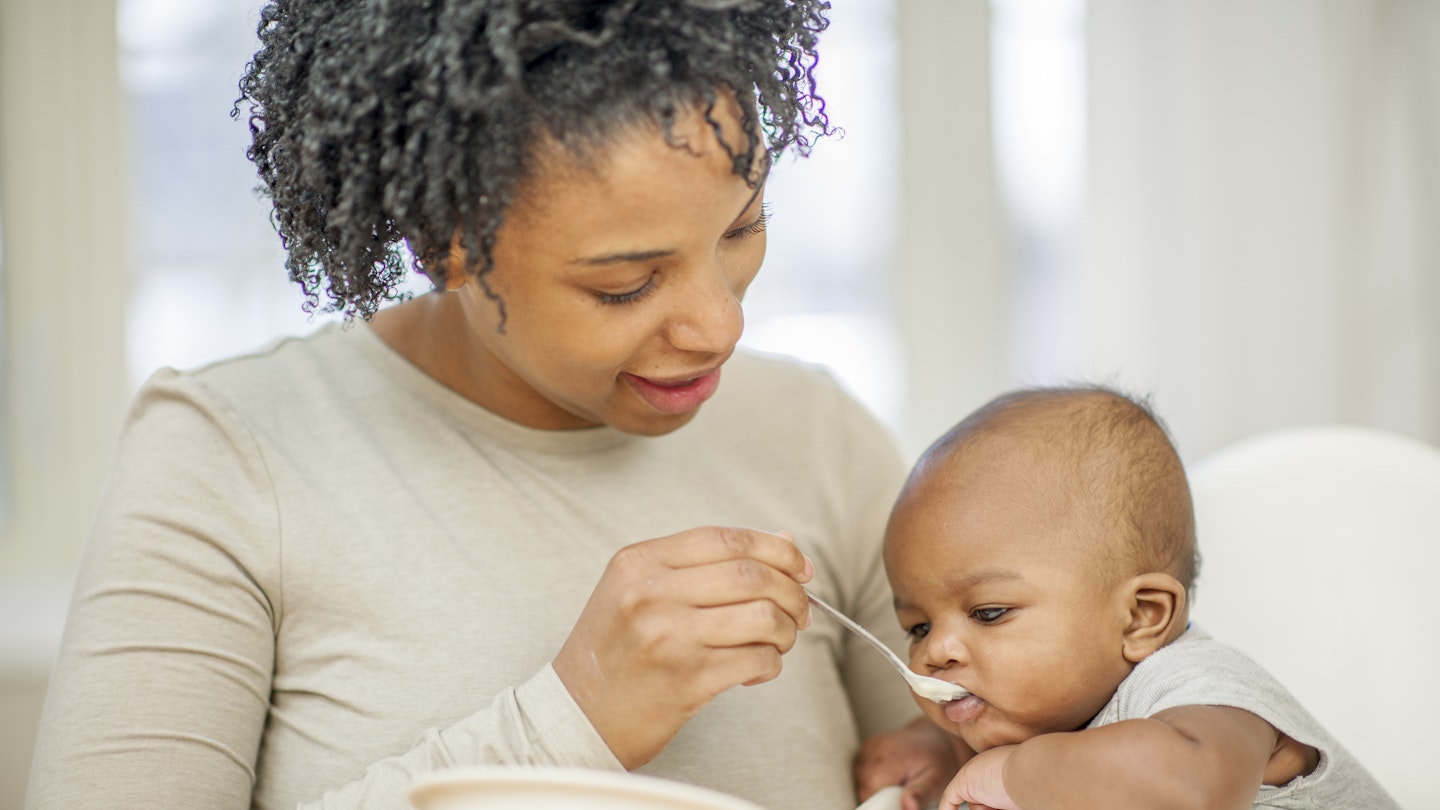If your baby is coming up to six months old, you might be starting to think about baby weaning and wondering what their first foods should be. You might be deciding between baby-led weaning and spoon-fed weaning, or thinking of doing a combination of the two. Whatever you choose, it's likely to be a learning experience for both of you and it's worth doing the research to make it as enjoyable as possible for you and your baby.
When it comes to first foods, many parents choose baby rice as it offers a gentle introduction to solid foods and a smooth texture which many babies find agreeable. But there are so many options to choose from and conflicting advice on when and how to give baby rice. To help guide you through everything you need to know about baby rice, we've enlisted the help of Baby & Child Nutritionist and author of How To Wean Your Baby, Charlotte Stirling-Reed.
Best baby rice at a glance:
What is baby rice?
Baby rice is just normal rice that has been ground to a fine consistency. It comes as a dry mixture, which is then mixed with water, formula or breastmilk. As it's a bland taste with a smooth texture, it's considered ideal as a first weaning food.
However, while baby rice can be a good option as a first food, it's a good idea to also introduce other flavours so your baby gets used to a wide range of tastes and textures.
Is baby rice good for babies?
You've probably heard of a lot of people using baby rice as their baby's first food when weaning and this is mainly because it's easy for your little munchkin to digest. But there are plenty of other positives too:
• It is suitable for both vegetarians and vegans
• It is hypoallergenic, so your baby is unlikely to have a reaction to it
• It has a bland taste so won't be too dissimilar to the milk flavour they're already used to
• It has a smooth, runny consistency once combined with milk, which means your baby won't have trouble swallowing it
• You can combine baby rice with milk or water
Our expert, Charlotte Stirling-Reed notes that some baby rice is fortified with vitamins and minerals, which can also be a benefit. But as she points out, while it can form part of their early diet, it shouldn't be the only food they try. "At the very start of weaning, we want babies to explore a variety of foods, flavours and textures and this is more of a benefit than focusing on getting lots of nutrients in. Babies rely on their milk as their main source of nutrition until around 10-12 months of age, which means that solid foods, especially at the start, are more about helping babies learn the process of eating and to accept a wide variety of flavours into their daily diet."
When can babies have baby rice?
While some baby rice brands are advertised as suitable from four months old, the NHS guidance is to start weaning your baby from six months old. However, all babies are different and some may be ready sooner so if you think your baby is ready for weaning before the six-month mark, speak to your doctor or health visitor.
How to make baby rice?
When making baby rice, it's best to follow the instructions on the specific brand you've bought. Typically, baby rice is combined with 3-4 spoonfuls of your baby's usual milk. We've also known some parents to use water but you should always follow the specific instructions for the baby rice product you're using.
If you are using milk, it's completely up to you whether you use it cold or warm, but if serving warm, remember to check the temperature before feeding your tot.
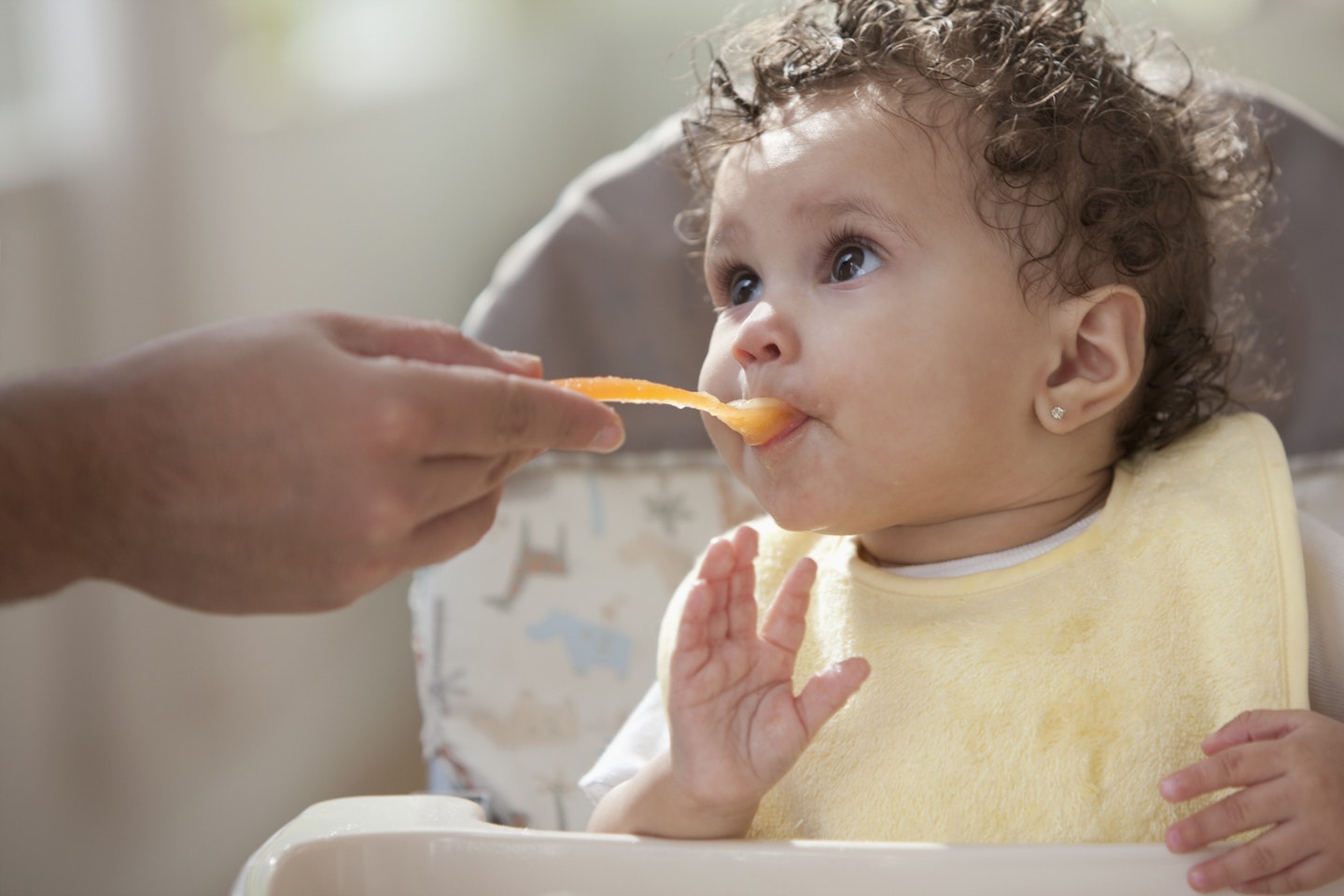
How often should my baby have baby rice?
Baby rice tends to be the starting point for parents before they move onto baby purees or finger foods, so you may find that after a couple of days of using baby rice, you'll feel comfortable moving on to other foods.
Baby rice can also be used to bulk out fruit and veg puree, so it's always useful to have a box around in the kitchen cupboards. It's worth bearing in mind that your baby doesn't need baby rice and you may prefer to dive straight into purees or baby-led weaning. It's completely up to you and what's best for your baby and your lifestyle.
In fact, a lot of experts now suggest starting with more flavoursome foods such as vegetables. Charlotte Stirling-Reed explains; "A whole host of new research has looked at the idea of weaning with vegetables first. Savoury, bitter, sweet veggies – you name it – should be offered in order to help encourage acceptance of vegetables and to expose babies to these flavours in early life to help children to develop a liking for these very early on."
Is baby rice safe?
A study revealed that certain brands of baby rice and cereals made with baby rice contained potentially harmful toxins such as arsenic and cadmium. These toxins are able to enter the product through contaminated water, which is used to irrigate rice crops in certain countries. Due to babies having a lower body weight than adults, they can take in a higher amount of arsenic.
However, the NHS states that "In the UK, there are maximum levels of inorganic arsenic allowed in rice and rice products, and even stricter levels are set for foods intended for young children." If you're concerned, speak to your doctor or simply use baby rice for a few days and then move onto other foods.
Can my baby have rice milk?
While baby rice can be used as a first food for weaning babies, the NHS advice is that it's best to avoid rice milk until they're 5 years old. This is because, if used as a substitute for breast milk or formula, they're likely to consume too much and the arsenic levels could become an issue.
What is the best baby rice for your baby?
There are a lot of different brands of baby rice, so we've whittled them down to our favourites.
Best overall baby rice
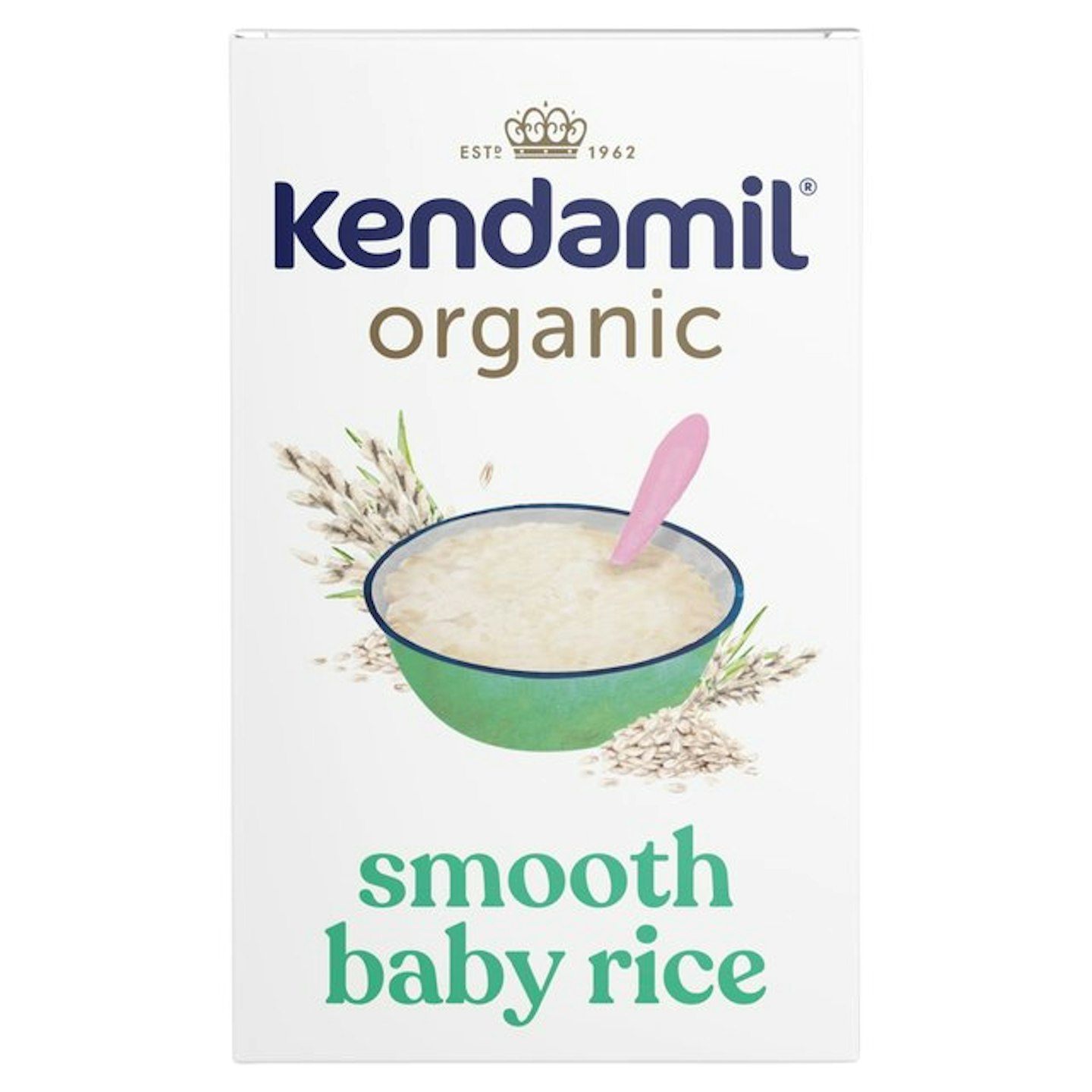
www.ocado.com
Kendamil's 5 Pack Organic Baby Rice is a premium, organic first food designed to support babies during the early stages of weaning. Made from 100% organic ingredients, it provides a gentle, nutritious start to solid foods, ensuring that your baby’s first tastes are as pure and natural as possible.
Best baby rice cereal
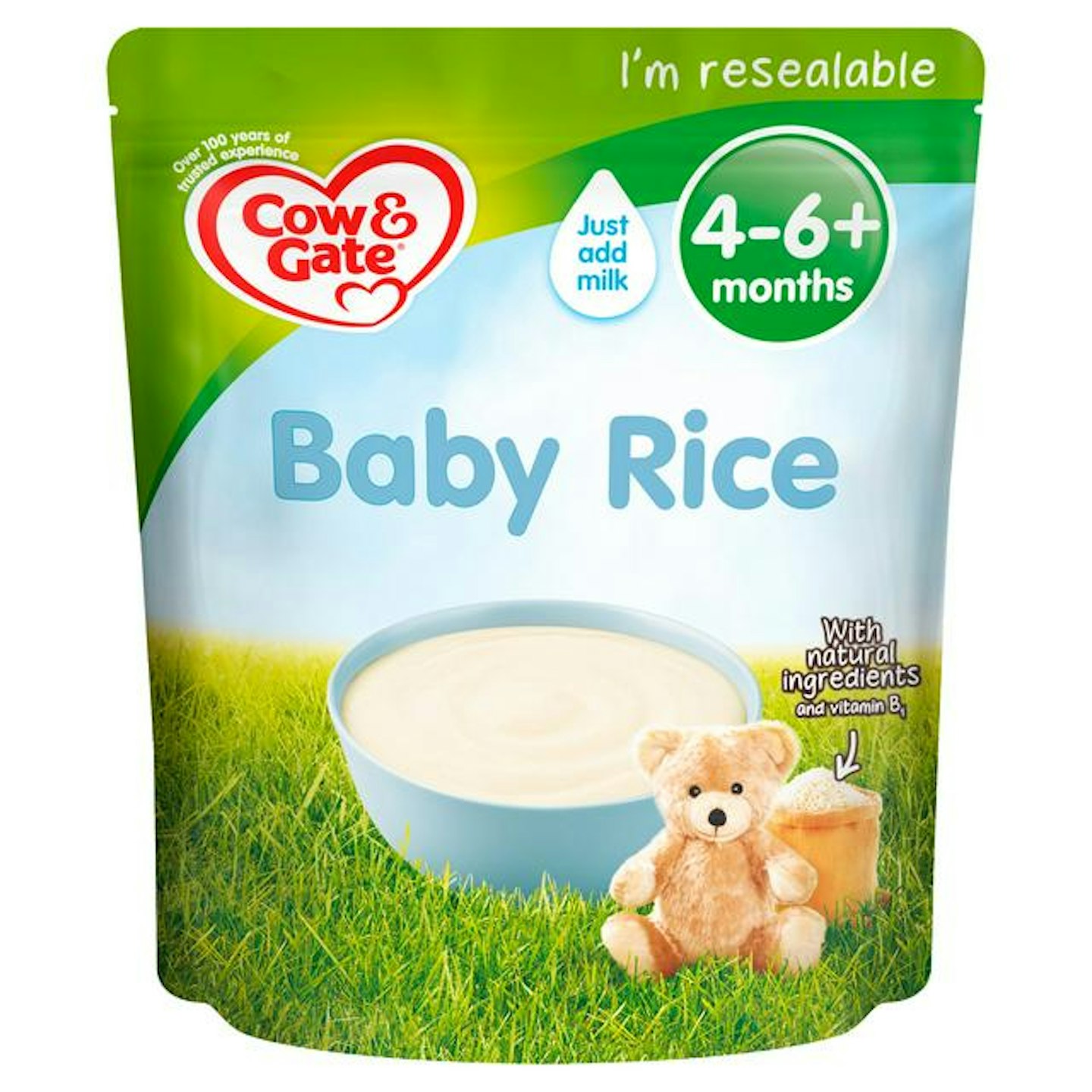
groceries.asda.com
This baby rice cereal is good for babies because it contains no added salt or sugar, ensuring a healthy start without unnecessary additives. Its gentle formula is perfect for sensitive tummies, helping babies gradually adapt to solids while still offering key nutrients. Cow & Gate's baby rice is also simple to prepare and can be mixed with breast milk or formula, making it a versatile and convenient weaning option that complements your baby's existing diet.
3.
Aptamil Organic Baby Rice
Best enriched baby rice
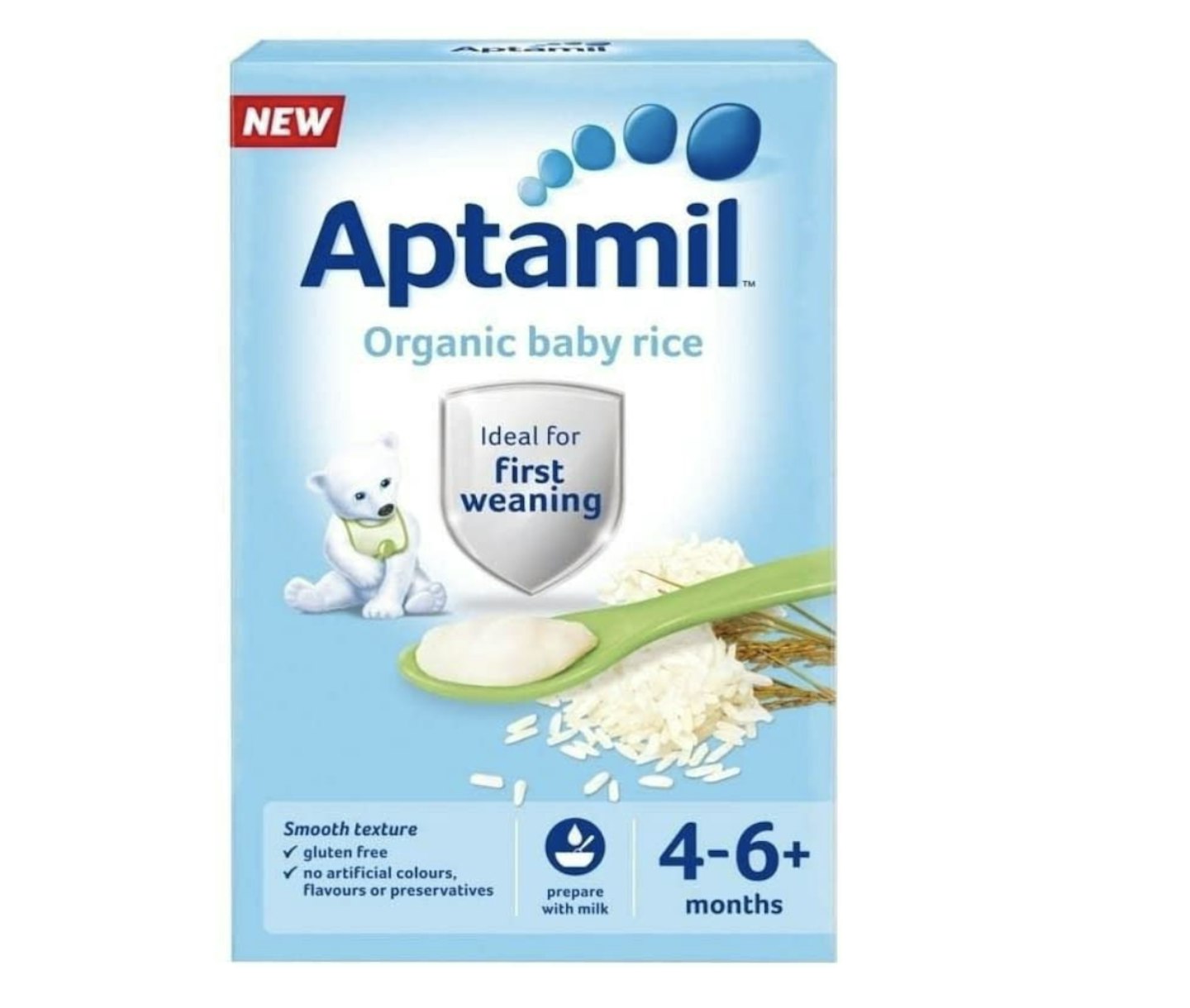
Aptamil Baby Rice Cereal, suitable for babies aged 4-6 months and older, is an excellent choice for introducing solid foods to your baby’s diet. As your baby begins the weaning process, their nutritional needs start to change, and Aptamil Baby Rice Cereal provides a smooth, gentle, and easily digestible option. Enriched with essential vitamins and minerals like iron, calcium, and vitamin D, it supports healthy growth and development during this crucial stage. Additionally, it helps babies transition from milk to solid foods, offering a mild taste and texture that is ideal for sensitive young tummies.
Best baby rice with added vitamins
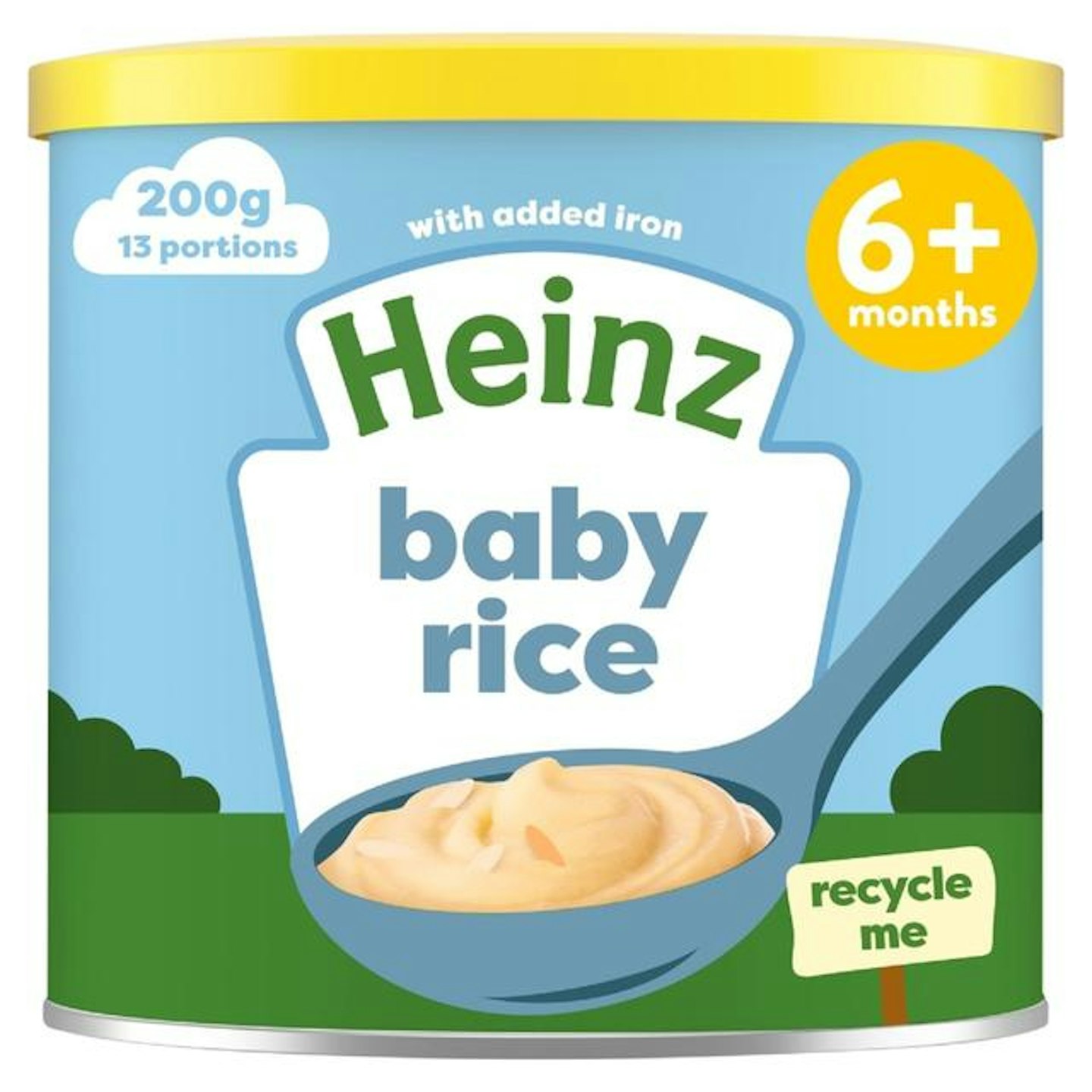
www.ocado.com
Heinz Baby Rice Porridge, designed for babies aged 6 months and older, is an excellent choice for supporting your baby's transition to solid foods. This smooth and creamy porridge is made with simple ingredients that are gentle on a baby’s developing digestive system. Fortified with essential nutrients like iron, calcium, and vitamins, it helps support healthy growth, brain development, and strong bones. With no added salt, sugar, or artificial preservatives, Heinz Baby Rice Porridge provides a nutritious and safe option for introducing solids into your baby’s diet.
Best organic baby rice

HiPP Organic 100% Baby Rice, suitable for babies aged 4 months and older, is an excellent choice for parents seeking a nutritious and gentle first food for their baby. This product is made from 100% organic rice, ensuring that it is free from artificial additives, preservatives, and pesticides. Its smooth texture is perfect for delicate young tummies, making it easy to digest and ideal for introducing your baby to solid foods. Enriched with essential nutrients, HiPP Baby Rice helps support healthy growth and development during the early stages of weaning.
Best for breakfast baby rice
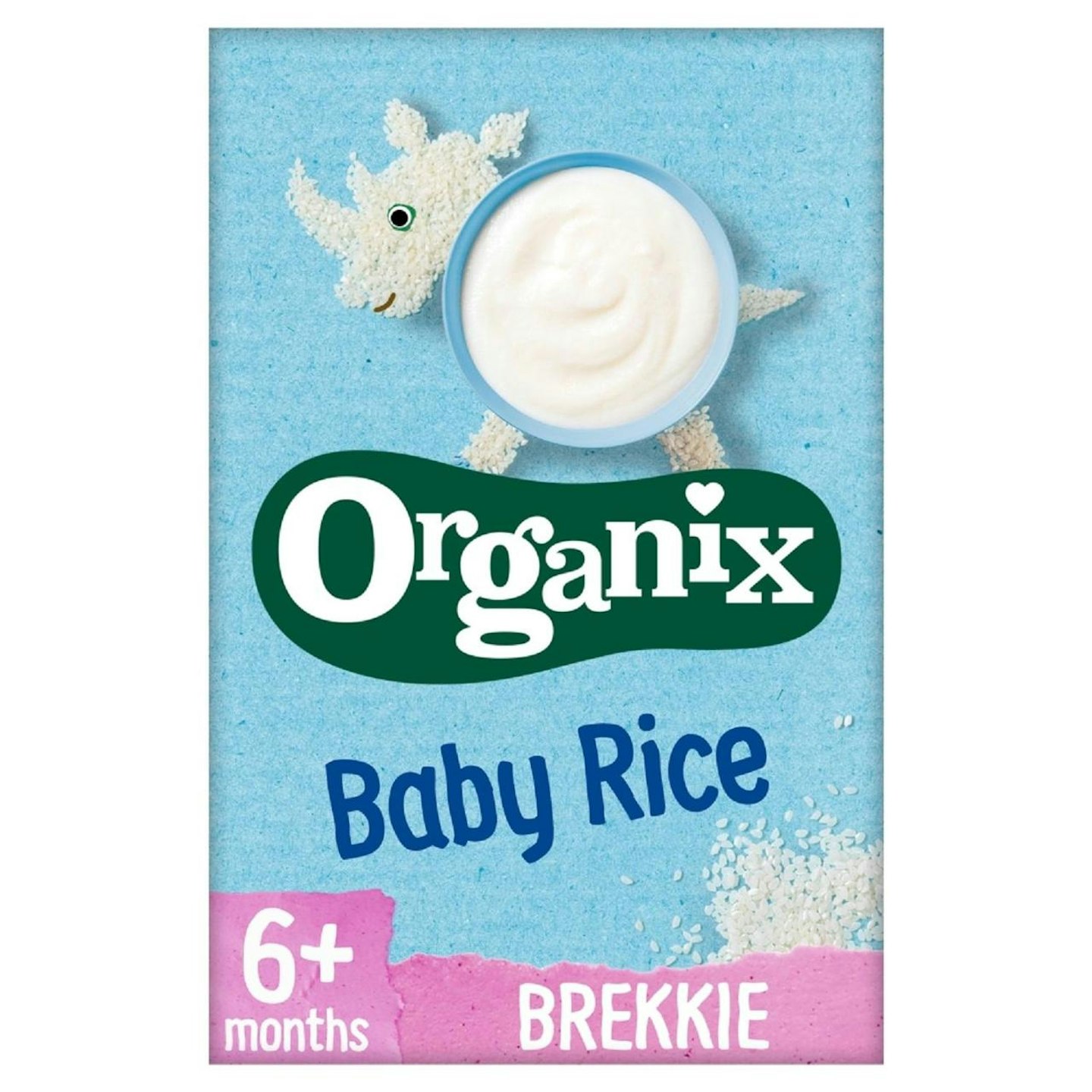
www.ocado.com
Looking for a fun and healthy way to kick-start your baby's food adventure? Organix Baby Rice Organic Cereal, designed for babies 6 months and older, is the perfect partner in your little one's journey to solid foods. Packed with the goodness of organic wholegrain rice, this cereal is as simple as it gets—just pure, gentle, and easy-to-digest nutrition without any nasties! It’s free from artificial flavors, colours, or preservatives, so you can trust that every spoonful is wholesome and nourishing.
Best baby rice for early weaning
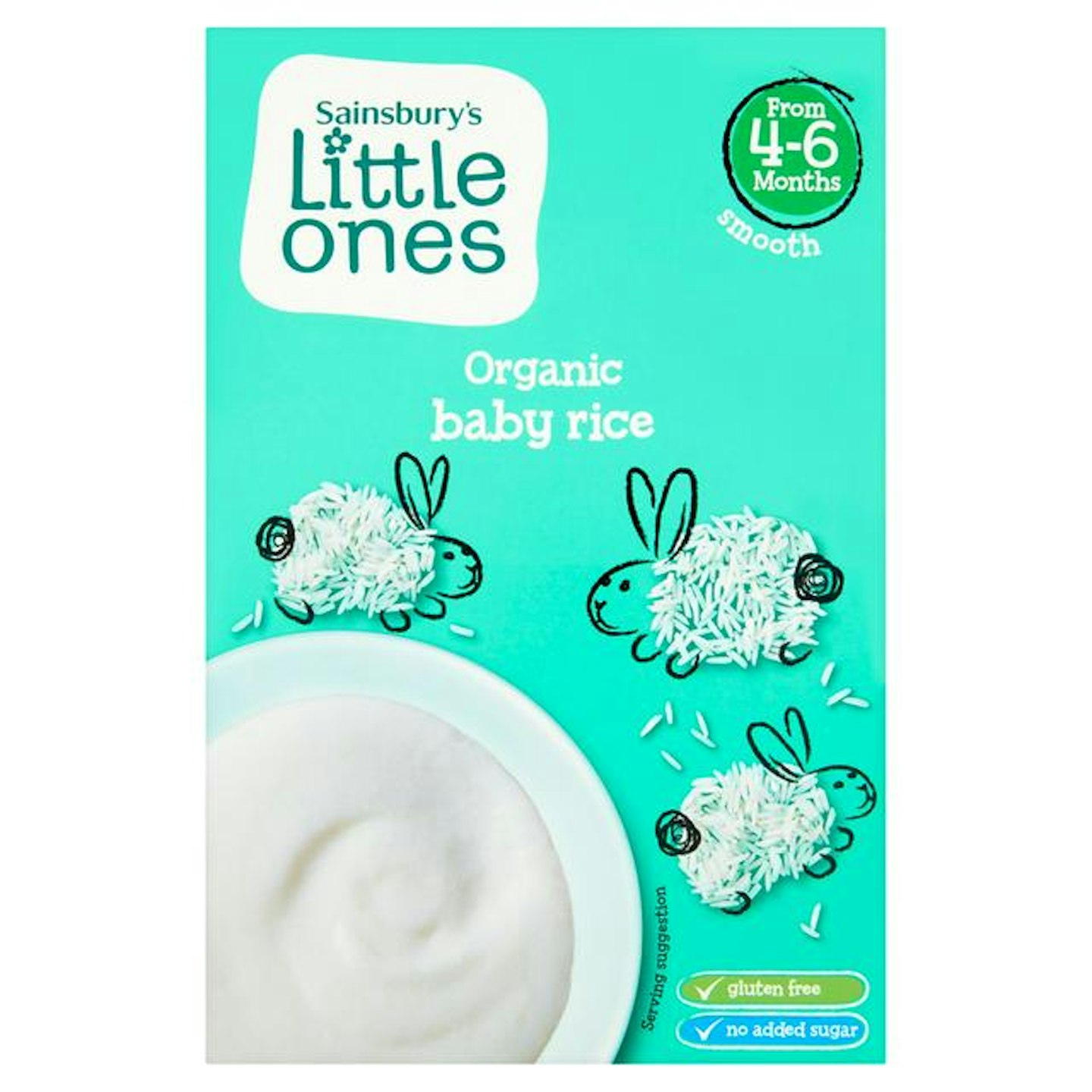
www.sainsburys.co.uk
Ready to start your baby’s foodie journey with a little fun and a lot of goodness? Little Ones Organic Baby Rice, perfect for 4+ months, is here to make that first bite smooth, simple, and oh-so-gentle. Made from 100% organic rice, it’s as pure as baby food gets—no weird stuff, just clean, wholesome grains to keep those tiny tummies happy. It's super easy to digest and the ideal introduction to solids, with a soft texture that’s just right for your little explorer.
Should you start babies weaning with baby rice?
Our expert tells us it's not essential to give your tot baby rice as a first food. In fact, as she said, "there is research that suggests offering a variety of flavours (including some savoury, bitter flavours too) can help babies to accept a wider variety of flavours as they get older" too". She explains that the early foods are more about helping your baby to explore flavours and learn how to eat. "We want babies to learn HOW to eat and HOW to accept foods that the rest of the family are eating and focusing ONLY on baby rice as a first food isn't an ideal way to do this."
Baby rice alternatives
If your baby isn't a fan of baby rice or you'd just like to try something different, here are some alternatives to try once your baby is six months:
• Quinoa
• Baby porridge
• Avocado
• Veggie puree
• Millet
• Barley
• Weetabix
Just be sure to prepare these alternatives so they are safe for your baby to enjoy. Charlotte Stirling-Reed also recommends Veg Led Weaning, where you offer your baby a variety of savoury and bitter veggies for the first few days of weaning to help them build some familiarity with these totally different tastes. "Weaning is all about experimenting with your baby, so offering some savoury foods as their first option can be a great way to help them explore some very new tastes early on. Research shows that frequent and varied vegetable offerings during weaning can help babies to accept them later on in their journey with foods."
Baby Rice: FAQs
Can I put baby rice in my baby's bottle?
It's not advisable to put baby rice in a bottle unless you've been advised to do so by your doctor or health visitor. Feeding them baby rice in a bottle can cause them to eat more than they need to and take in too many extra calories.
What is the difference between baby rice and normal rice?
Baby rice is the same as normal rice that we eat but it has been ground to a fine powder so it's easier for babies to eat as a first food when they're weaning.
How much baby rice for a 4 month old?
The NHS doesn't advise starting weaning before 6 months so if your 4 month old baby seems particularly hungry it could be better to increase the frequency of their feeds. Speak to your health visitor or GP if you're concerned.
About the expert
Charlotte Stirling-Reed is “The Baby & Child Nutritionist” and is a Registered Nutritionist with the Association for Nutrition. Charlotte is also an author and mum to little foodies Raffy and Adaline, and owner of consultancy, SR Nutrition. It’s her mission in her work to give parents confidence in feeding their children.
About the author
Adejumoke Ilori is a Commercial and Content Writer for Mother&Baby. She is a mummy of one who's been through the weaning process with her daughter and is able to use her own experiences to help other parents. She enjoys writing about baby world, mothership, true life stories (especially single parenthood), and celebrity gossip. With a degree in Creative Writing, she has also worked with media platforms like, OK! Magazine, New, She Rose Revolution and Fab Magazine.
